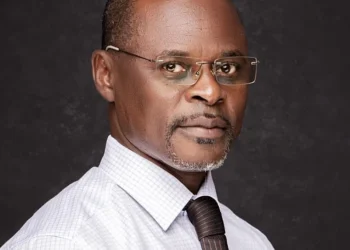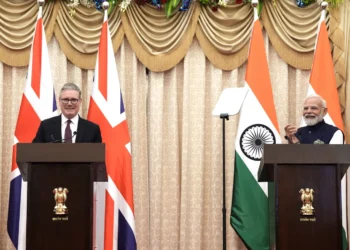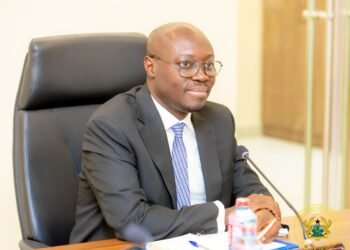The Chairman of the Minerals Commission Board, Mr. William Ntow Boahene, Esq., has underscored the government’s determination to overhaul Ghana’s mining regulatory framework.
Addressing the Greater Accra Regional House of Chiefs, he highlighted the need for urgent reforms to respond to evolving environmental, legal, and community dynamics.
Speaking candidly to the traditional leaders, Mr. Boahene emphasized that stakeholder engagement, particularly with chiefs and land custodians, is not only necessary but critical to ensuring that new policies and legal instruments reflect the lived realities of affected communities.
“Our traditional authorities are not only the custodians of land but also of cultural values.
“Their voices are indispensable in shaping a framework that not only governs mining activity but protects the interests of future generations.”
Mr. William Ntow Boahene, Esq., Chairman of the Minerals Commission Board

The forum, hosted under the auspices of the Minerals Commission, drew a chorus of agreement from the chiefs, who echoed concerns about the long-term effects of mining on land, water bodies, and livelihoods.
“While the current legislation has provided a foundation, we can no longer ignore the visible consequences of inaction.
“Our rivers are drying up, farmlands are destroyed, and our ecosystems are under threat. These challenges call for visionary reform.”
Mr. William Ntow Boahene, Esq., Chairman of the Minerals Commission Board
President of the Greater Accra Regional House of Chiefs, King Professor Odaifio Welentsi III, lauded the Commission’s outreach, stressing that a reformed mining sector must honour the balance of power and responsibility between the state and traditional rulers.
King Welentsi emphasized that while the Constitution vests mineral ownership in the President, the chiefs play a significant role in land administration and community engagement.

“Traditional authorities must not be an afterthought.
“The law requires our notification before mineral rights are granted, and annual ground rent must be paid for stool lands. Yet, in many cases, the revenue trickling down to us is negligible.”
King Professor Odaifio Welentsi III, President of the Greater Accra Regional House of Chiefs
He further noted that traditional leaders are legally mandated to be part of compensation and resettlement monitoring processes and should be represented on the Minerals Development Fund governing board.
Praising the recent introduction of a nine-year cap on prospecting licenses, the chief described the move as “a bold step toward ensuring responsible mining.”
“The ‘use it or lose it’ principle will compel investors to act responsibly or lose their rights.”
King Professor Odaifio Welentsi III, President of the Greater Accra Regional House of Chiefs
Reforming Mining Governance Framework

Also addressing the gathering, Mr. Josef Iroko, Legal Manager at the Minerals Commission, offered a detailed review of Ghana’s mining laws, with a focus on regulatory oversight, lease ratification by Parliament, and community-based governance structures.
He emphasized that District Mining Committees play a vital role in ensuring local oversight and community involvement.
“The legal structure places responsibility not only on regulators and operators but on the traditional authorities who hold allodial title to land.
“Compensation, engagement, and environmental stewardship are all built into our legal system.”
Mr. Josef Iroko, Legal Manager at the Minerals Commission
Mr. Iroko also reviewed the Minerals and Mining Act, 2006 (Act 703), and outlined amendments over the years, stressing how Parliament’s ratification role has deepened transparency and ensured greater accountability in granting mining rights.
Taking a broader perspective, Mr. Benjamin Aryee, former CEO of the Minerals Commission and current advisor to the Minister for Lands and Natural Resources, reflected on Ghana’s 2014 Mining Policy.
He underscored the need to update the policy in light of global shifts and local experiences. According to Mr. Aryee, the emerging global focus on climate change, ESG (Environmental, Social, and Governance) standards, and critical minerals has reshaped the industry.

“We must now factor in the rising demand for green minerals used in electric vehicles, batteries, and clean energy. This is not optional, it’s an economic imperative.”
Mr. Benjamin Aryee, former CEO of the Minerals Commission
Mr. Aryee also pointed to government initiatives such as Cooperative Mining and the reclassification of mining operations, including the introduction of a medium-scale mining category, as examples of policy innovation.
“Small-scale mining plays a strategic role in Ghana’s economy.
“We must formalize it, regulate it effectively, and integrate it within a forward-thinking policy structure that reflects today’s realities.”
Mr. Benjamin Aryee, former CEO of the Minerals Commission
The dialogue between the Minerals Commission and traditional authorities underscored one central message: that Ghana’s mining future cannot be defined by outdated rules and disconnected policies.
Instead, it must be shaped by inclusive governance, modern sustainability standards, and a firm resolve to balance economic opportunity with environmental and community preservation.
The comprehensive review now underway signals a bold and timely initiative by the Minerals Commission to craft a more resilient, equitable, and sustainable mining framework.
The involvement of traditional leaders at this stage is not only commendable but essential in ensuring that the future of Ghana’s mining industry is deeply rooted in local realities while responsive to global standards.
READ ALSO: Ghana’s Mobile Money Borrowing Surges: 22% of Adults Now Rely on It – World Bank



















